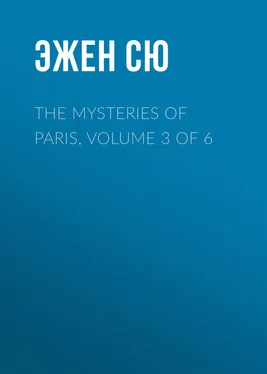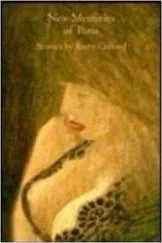Эжен Сю - The Mysteries of Paris, Volume 3 of 6
Здесь есть возможность читать онлайн «Эжен Сю - The Mysteries of Paris, Volume 3 of 6» — ознакомительный отрывок электронной книги совершенно бесплатно, а после прочтения отрывка купить полную версию. В некоторых случаях можно слушать аудио, скачать через торрент в формате fb2 и присутствует краткое содержание. Жанр: literature_19, foreign_antique, foreign_prose, на английском языке. Описание произведения, (предисловие) а так же отзывы посетителей доступны на портале библиотеки ЛибКат.
- Название:The Mysteries of Paris, Volume 3 of 6
- Автор:
- Жанр:
- Год:неизвестен
- ISBN:нет данных
- Рейтинг книги:5 / 5. Голосов: 1
-
Избранное:Добавить в избранное
- Отзывы:
-
Ваша оценка:
- 100
- 1
- 2
- 3
- 4
- 5
The Mysteries of Paris, Volume 3 of 6: краткое содержание, описание и аннотация
Предлагаем к чтению аннотацию, описание, краткое содержание или предисловие (зависит от того, что написал сам автор книги «The Mysteries of Paris, Volume 3 of 6»). Если вы не нашли необходимую информацию о книге — напишите в комментариях, мы постараемся отыскать её.
The Mysteries of Paris, Volume 3 of 6 — читать онлайн ознакомительный отрывок
Ниже представлен текст книги, разбитый по страницам. Система сохранения места последней прочитанной страницы, позволяет с удобством читать онлайн бесплатно книгу «The Mysteries of Paris, Volume 3 of 6», без необходимости каждый раз заново искать на чём Вы остановились. Поставьте закладку, и сможете в любой момент перейти на страницу, на которой закончили чтение.
Интервал:
Закладка:
"Ah!" cried Rodolph, "the villain had evidently taken every precaution to prevent detection."
"He had, indeed. As for me, sir," continued Louise, "I was so thunderstruck with horror at these assertions of M. Ferrand, that I knew not what to reply. Ignorant of my having taken anything to induce sleep, I felt wholly unable to account for my having slept so unusually heavy and long. Appearances were strongly against me; what would it avail for me to publish the dreadful story? No one would believe me innocent. How, indeed, could I hope or expect they should, when even to myself the events of that fatal night continued an impenetrable mystery?"
Even Rodolph remained speechless with horror at this fearful revelation of the diabolical hypocrisy of M. Ferrand.
"Then," said he, after a pause of some minutes, "you never ventured to inform your father of the infamous treatment you had received?"
"No," answered she, "for I dreaded lest he might suppose I had willingly listened to the persuasions of my master; and I also feared that, in the first burst of his indignation, my poor father would forget that not only his own freedom, but the very existence of his family, depended upon the pleasure of M. Ferrand."
"And probably," continued Rodolph, desirous if possible to save Louise the painful confession, "probably, yielding to constraint, and the dread of endangering the safety of your father and family by a refusal, you continued to be the victim of this monster's brutality?"
Louise spoke not, but her cast-down eyes, and the deep blushes which dyed her pale cheek, answered most painfully in the affirmative.
"And was his conduct afterwards less barbarous and unfeeling than before?"
"Not in the least. And when, by chance, my master had the curé and vicaire of Bonne Nouvelle to dine with him, the better to avert all suspicion from himself, he would scold me severely in their presence, and even beg M. le Curé to admonish me, assuring him that some day or other I should fall into ruin; that I was a girl of free and bold manners, and that he could not make me keep my distance with the young men in his office; that I was an idle, unworthy person, whom he only kept out of charity and pity for my father, who was an honest man with a large family, whom he had greatly served and obliged. With the exception of that part of the statement which referred to my father, the rest was utterly false. I never, by any chance, saw the clerks belonging to his office, as it was situated in a building entirely detached from the house."
"And, when alone with M. Ferrand, how did he account for his treatment of you before the curé?"
"He assured me he was only jesting. However, the curé believed him, and reprehended me very severely, saying that a person must be vicious indeed to go astray in so godly a household, where I had none but the most holy and religious examples before my eyes. I knew not what answer to make to this address; I felt my cheeks burn and my eyes involuntarily cast down. All these indications of shame and confusion were construed to my disadvantage, until, at length, sick at heart, and weary, and disgusted, my very life seemed a burden to me, and many times I felt tempted to destroy myself; but the thoughts of my parents, my poor brothers and sisters, that my small earnings helped to maintain, deterred me from ending my sorrows by death. I therefore resigned myself to my wretched fate, finding one consolation, amidst the degradation of my lot, in the thought that, at least, I had preserved my father from the horrors of a prison. But a fresh misfortune overwhelmed me; I became enceinte . I now felt myself lost indeed. A secret presentiment assured me that, when M. Ferrand became aware of a circumstance which ought, at least, to have rendered him less harsh and cruel, he would treat me even more unkindly than before. I was still, however, far from expecting what afterwards occurred."
At this moment, Morel, recovering from his temporary abstraction, gazed around him, as though trying to collect his ideas, then, pressing his hand upon his forehead, looked at his daughter with an inquiring glance, and said:
"I fancy I have been ill, or something is wrong with my head – grief – fatigue – tell me, my child – what were you saying just now? I seem almost unable to recollect."
"When," continued Louise, unheeding her father's look, "when M. Ferrand discovered that I was likely to become a mother – "
Here the lapidary waved his hand in despairing agony, but Rodolph calmed him by an imploring look.
"Yes, yes," said Morel, "let me hear all; 'tis fit and right the tale should be told. Go on, go on, my girl, and I will listen from beginning to end."
Louise went on. "I besought M. Ferrand to tell me by what means I should conceal my shame, and the consequence of a crime of which he was the author. Alas, dear father, I can scarcely hope or believe you will credit what I am about to tell you."
"What did he say? Speak."
"Interrupting me with much indignation and well-feigned surprise, he affected not to understand my meaning, and even inquired whether I had not lost my senses. Terrified, I exclaimed, 'Oh, sir, what is to become of me? Alas, if you have no pity on me, pity at least the poor infant that must soon see the light!'
"'What a lost, depraved character!' cried M. Ferrand, raising his clasped hands towards heaven. 'Horrible, indeed! Why, you poor, wretched girl, is it possible that you have the audacity to accuse me of disgracing myself by any illicit acquaintance with a person of your infamous description? Can it be that you have the hardihood to lay the fruits of your immoral conduct and gross irregularity at my door, – I, who have repeated a hundred times, in the presence of respectable witnesses, that you would come to ruin some day, vile profligate that you are? Quit my house this instant, or I will drive you out!'"
Rodolph and Morel were struck with horror; a system of wickedness like this seemed to freeze their blood.
"By Heaven!" said Rodolph, "this surpasses any horrors that imagination could have conceived."
Morel did not speak, but his eyes expanded fearfully, whilst a convulsive spasm contracted his features. He quitted the stool on which he was sitting, opened a drawer suddenly, and, taking out a long and very sharp file, fixed in a wooden handle, he rushed towards the door. Rodolph, guessing his thoughts, seized his arm, and stopped his progress.
"Morel, where are you going? You will do a mischief, unhappy man!"
"Take care," exclaimed the infuriated artisan, struggling, "or I shall commit two crimes instead of one!" and the madman threatened Rodolph.
"Father, it is our benefactor!" exclaimed Louise.
"He is jesting at us; he wants to save the notary," replied Morel, quite crazed, and struggling with Rodolph. At the end of a second, the latter disarmed him, carefully opened the door, and threw the file out on the staircase. Louise ran to the lapidary, embraced him, and said:
"Father, it is our benefactor! You have raised your hand against him, – recover yourself."
These words recalled Morel to himself, and hiding his face in his hands, he fell mutely on his knees before Rodolph.
"Rise, rise, unhappy father," said Rodolph, in accents of great kindness; "be patient, be patient, I understand your wrath and share your hatred; but, in the name of your vengeance, do not compromise your daughter!"
"Louise! – my daughter!" cried the lapidary, rising, "but what can justice – the law – do against that? We are but poor wretches, and were we to accuse this rich, powerful, and respected man, we should be laughed to scorn. Ha! ha! ha!" and he laughed convulsively, "and they would be right. Where would be our proofs? – yes, our proofs? No one would believe us. So, I tell you – I tell you," he added, with increased fury, "I tell you that I have no confidence but in the impartiality of my knife."
Читать дальшеИнтервал:
Закладка:
Похожие книги на «The Mysteries of Paris, Volume 3 of 6»
Представляем Вашему вниманию похожие книги на «The Mysteries of Paris, Volume 3 of 6» списком для выбора. Мы отобрали схожую по названию и смыслу литературу в надежде предоставить читателям больше вариантов отыскать новые, интересные, ещё непрочитанные произведения.
Обсуждение, отзывы о книге «The Mysteries of Paris, Volume 3 of 6» и просто собственные мнения читателей. Оставьте ваши комментарии, напишите, что Вы думаете о произведении, его смысле или главных героях. Укажите что конкретно понравилось, а что нет, и почему Вы так считаете.












